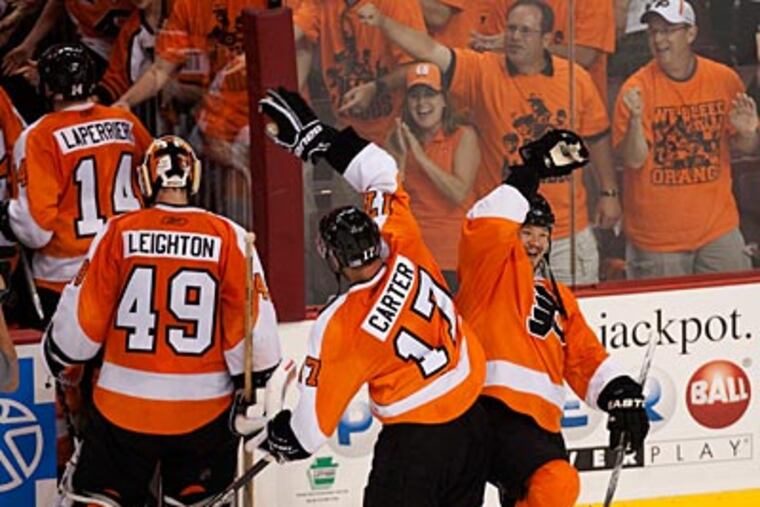Flyers snuff Chicago's momentum, for now
CHICAGO'S Patrick Kane asked the first question early in the third period of Game 3 of the Stanley Cup finals. Ville Leino answered for the Flyers 20 seconds later.

CHICAGO'S Patrick Kane asked the first question early in the third period of Game 3 of the Stanley Cup finals. Ville Leino answered for the Flyers 20 seconds later.
The Blackhawks' Patrick Sharp asked the next question late in the first period of Game 4. Claude Giroux answered for the Flyers 51 seconds later.
In Game 3, Leino's goal got the Flyers even. In Game 4, Giroux's goal restored a two-goal cushion that defined the rest of the evening. In both games, the answers snuffed out any hint of momentum being generated by the Blackhawks. In an enterprise decided less by grand strategies than by split seconds of gumption, the Flyers have tied the Stanley Cup finals because of just those kinds of moments.
Yes, they have tied the Cup series. Trailing by two games to none, the Flyers have brought it to two games apiece. With their barely-holding-on, 5-3 victory in Game 4, the Flyers head to Chicago with momentum (which is meaningless) and with confidence (which they never lost anyway). Miles to go yet.
Still, for the second straight game, the Flyers above all else demonstrated an ability to identify the moments upon which games tend to pivot - and then hanging on in the end. It really is what winning in professional sports is all about. Coaches spend their lives drawing up plays and devising intricate plans, but it is about the players and it is about those small units of time, when things begin to turn.
"It's something that we want to do, get right back at it," Flyers defenseman Chris Pronger said. "You have to roll with the punches. If they score a goal, you have to get right back on the horse and continue to press and play your game. By doing that, we've been able to bounce right back and get goals."
Pronger is the closest thing there has been in this series to a constant - he and his Chicago counterpart, Duncan Keith. Their play has been there throughout, outstanding throughout, the rocks upon which everything else is built - really, for both teams. But everything else has evolved, adapted, changed with time and space and energy.
With that, these moments present themselves. You recognize them and you make them yours, or you lose.
The Flyers - Giroux and Kimmo Timonen specifically - made the moment theirs.
It was late in the first period and the Flyers held a 2-0 lead. Then, at 18:32, Sharp struck, deflecting in a shot from out near the blue line by Keith. Suddenly, a rollicking start at the Wachovia Center just got a little bit nervous. The difference between 2-0 and 2-1 in a Stanley Cup finals game is the difference between control and consternation.
The overtime in Game 3 was over, yes, but that early first period last night seemed to be a continuation of the game before. As Giroux said, "I think we had a good first period, and the whole team just came out strong. I think it was our best first period of the series, for sure. I think we took the momentum from that third period of the last game, and we really were skating and working hard."
But then, near the end of the period, Sharp's goal added a new question. Would the Flyers struggle now as the game got tighter? Would the Blackhawks, heavy favorites in the series, use that opening to re-establish the order that the oddsmakers had originally predicted?
Fifty-one seconds later, we found out the answer. Timonen, out near the blue line, spotted Giroux to the left side of the Chicago net, right near the goal line, completely uncovered and unseen by any Blackhawks defender. It is a sight that a hockey player almost never sees.
Timonen's pass was precise. Giroux's opening was expansive as Chicago goaltender Antti Niemi came out to the top of the crease, anticipating a shot from Timonen. Giroux couldn't have missed if he had tried.
And, right there, the Flyers re-established their two-goal lead, which allowed them to play a cautious-enough, fairly controlling second period - and undoubtedly gave the Blackhawks a few internal questions about how many times they were going to have to reclimb the same hill.
"I don't know about the other team but, for us, it helped," Flyers forward Simon Gagne said. "It's great to see. That shows the character of the team . . . I'm not sure what they thought when it happened but it was a huge plus for us."
After the game, Blackhawks coach Joel Quenneville didn't buy the controlling part, but he acknowledged, "I know we're playing catch-up the whole game . . . I don't know who was controlling but they obviously had the lead. So they were dictating a little bit more than we would like."
It was the Giroux goal that gave the Flyers that opportunity.
When Leino banked in a goal off Chicago's Kris Versteeg in the third period, the two-goal lead became a three-goal lead - which was a good thing for the Flyers, as the Blackhawks scored twice down the stretch. First, Dave Bolland scored on a five-on-three power-play advantage. Then Brian Campbell scored on a long shot that hit somebody along the way. And then, in the final couple of minutes, there were several great chances by Chicago that just failed to find the back of the net. Only Jeff Carter's empty-net goal with 24.6 seconds remaining ended the late drama.
Anybody who thinks the Blackhawks were not energized by the third period is kidding himself. Miles, and moments, to go.
Send e-mail to
or read his blog, The Idle Rich, at
http://go.philly.com/theidlerich.
For recent columns go to